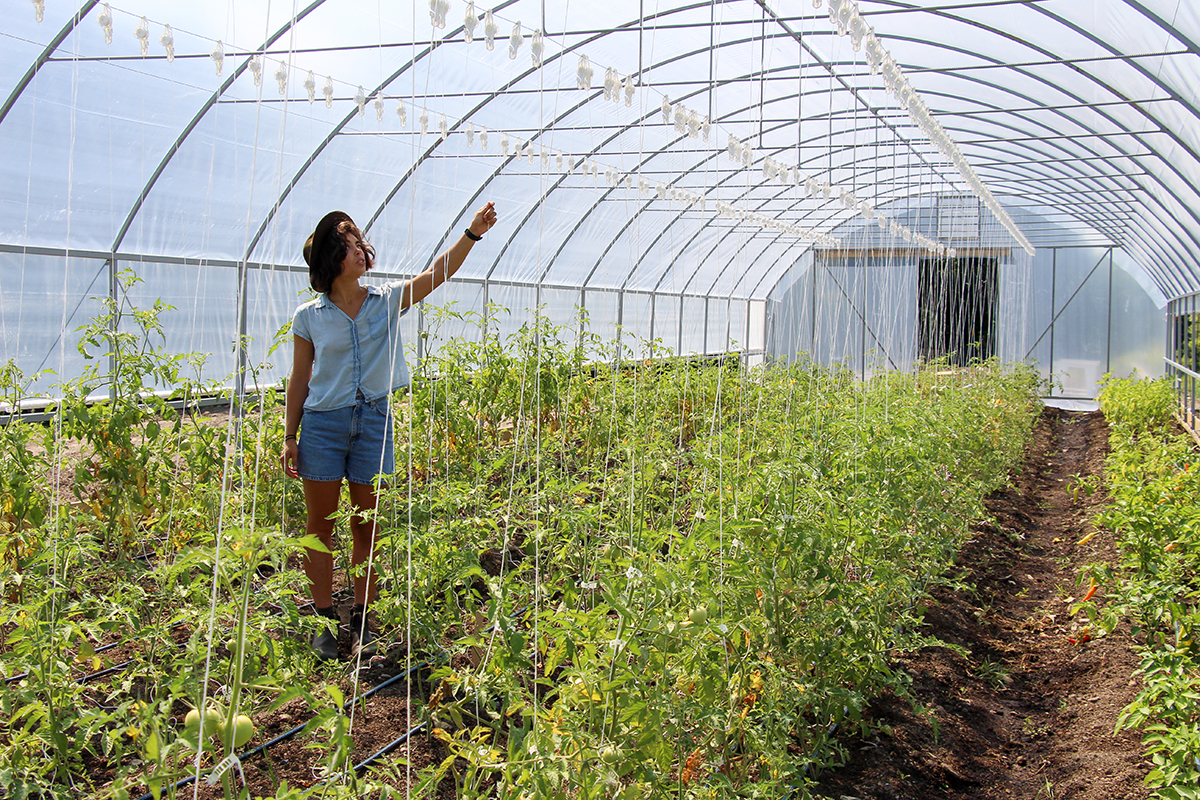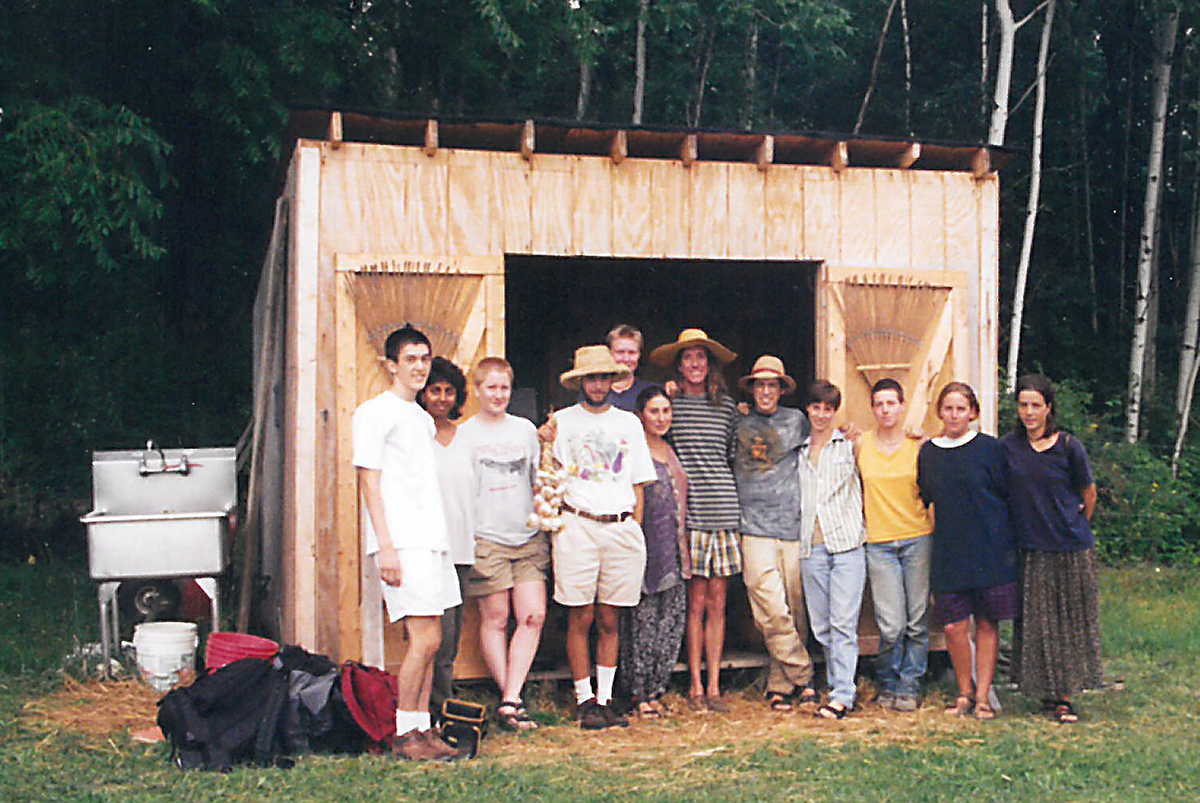Dilmun Hill Student Farm celebrates 20 years
By Krisy Gashler

It started as a simple idea: Cornell students learning about farming should have someplace to actually farm. Thus was born Dilmun Hill.
In the 20 years since students tilled those first three acres, the farm has expanded and improved, provided opportunities for research and experimentation, started students on a path toward agricultural careers and fostered lifelong friendships. Today, Dilmun Hill Student Farm encompasses 12 acres of land, and it produces organically grown vegetables for its community-supported agriculture program and on-campus restaurants.
To celebrate the anniversary of the farm’s founding in 1996, students will welcome the community to a farm tour Oct. 29, 1-4 p.m., at 705 Dryden Road (Route 366), Ithaca. There will be booths and exhibits plus activities from many agriculture-related clubs on campus, such as the Bee Club and the Cornell Fantastic Fungi Fanatics. The party is a chance to learn more about agriculture, the joys and challenges of growing food, and the dedication it takes to be a student farmer.
For many Cornell alumni who have taken part in the Dilmun Hill experience, memories of the farm are some of the most vivid from their time at the university.
Benjamin Scott-Killian ’08 was a co-manager in 2007. He and his wife now live in Washington state, where they raise cattle, pigs and poultry, and are working to establish a grade-A creamery.
“Dilmun Hill was the first place where I was able to connect my passion for ecology and environmental stewardship with growing food. It was so empowering for me, a kid from suburban Long Island, to be able to transmute my activism and love for science into the kinetic, social and spiritual activity of farming,” Killian said. “Now, as a farmer on my own land, I’m so grateful for that experiential education I had at Dilmun Hill.”
Dilmun’s current crop of students affirms the value of experiential learning. A season as vegetable production co-manager has taught Kirby Peters ’17 about irrigation, pest control, and – most importantly – working cooperatively.
“With vegetable production, everything is so time sensitive. It’s a lot of work, compromising and constantly making decisions with a group of five people, but we’ve gotten really good at communication,” he said.

Peters and Nina Sannes ’19 manage this season’s Market Garden, a 1.5 acre vegetable plot and herb garden that has been the primary project since the farm’s inception. Rather than growing standard commercial crops, the garden features heirloom and unusual varieties to reinforce the experiential learning vital for sustainable agriculture.
While supported by Cornell University’s Agricultural Experiment Station, it’s the students who take the lead in the day-to-day management and farming practices. Each year four or five students are hired to manage various aspects of the farm, from vegetable production and greenhouse management to wholesale production and coordinating the CSA. The managers decide what crops to grow, select the varieties, research how to grow crops and decide how to sell the produce.
Other students take leadership roles on the steering committee and, with the managers, put in the labor to grow, care for and harvest the crops. While many are majors across the College of Agriculture and Life Sciences, Dilmun Hill is a universitywide resource: steering members in this year’s class are enrolled in the Colleges of Arts and Sciences and Engineering and the ILR School.
Student volunteers also play a crucial role at Dilmun Hill. Work parties are held twice a week throughout the growing season, allowing students to take part in growing and harvesting. Access to the campus farm allows large groups of student volunteers to get involved and contribute.
Coordinator Betsy Leonard mentors and advises students on operations, from pest management to administrative details. “Our students learn the tenets needed to grow and manage a complete farm operation. Just like on any farm, the students have to be resourceful and diligent to produce in a constantly changing environment. The experience they get here at Cornell prepares many of our students to become agricultural leaders.”
Development sociology major and wholesale production manager Noelle LaDue ’19 was drawn to Dilmun by her interest in rural land management and inequality.
“I want to study displacement of small farmers and how that contributes to inequality, so I wanted to get first-hand experience in farming,” she said. “I’ve done a lot of really fast learning at Dilmun.”
Learn more about the history of the farm and the projects run by the students at: http://cuaes.cals.cornell.edu/farms/dilmun-hill.
Krisy Gashler is a freelance writer for the College of Agriculture and Life Sciences.
Media Contact
Get Cornell news delivered right to your inbox.
Subscribe